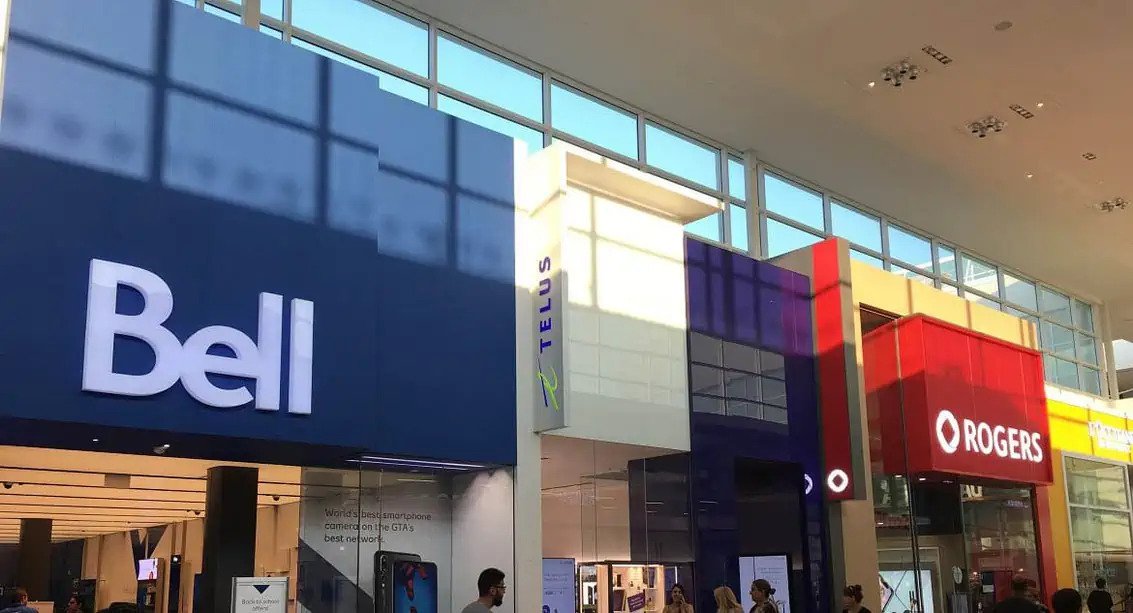Rogers Canadian Mobile Carriers : Everything You Need to Know

Rogers Canadian Carriers. The mobile carrier industry in Canada can be confusing due to the constantly changing landscape of new and old carriers, varied pricing from province to province, and even gas stations offering mobile plans. There are many brands to choose from, with over two dozen options across the country. Even though a few dominant carriers control a large portion of the wireless spectrum, many smaller brands still offer a range of services. Understanding the various options and who these carriers are can be challenging.
Lets talk more on Canadian Mobile Carriers.
Who Owns Wireless Spectrum in Canada?
Wireless spectrum refers to the range of radio frequencies used for wireless communication. These frequencies were originally controlled by the government and are now owned by cell phone carriers. Carriers build networks of towers to transmit signals to all parts of the country.
Owning the wireless spectrum is like owning the pipelines that connect cell phones to the rest of the world.
In Canada, the three major mobile carriers and their subsidiary brands hold around 90% of the market share, leading some to consider the industry an oligopoly. These carriers, referred to as full-service carriers, are outlined in the following table.
| Carrier | Geographic Focus | Rank Based on Subscribers | Owner |
|---|---|---|---|
| Rogers Wireless | Nationwide | Canada’s largest carrier | Rogers Communications |
| Bell Mobility | Nationwide | Canada’s second-largest carrier | BCE Inc. |
| Telus Mobility | Nationwide | Canada’s third largest carrier | Telus Corporation |
| Freedom Mobile | Nationwide however LTE coverage is not strong in many areas | Canada’s fourth largest carrier | Shaw Communications |
| Vidéotron Mobile | Quebec and Ottawa | Canada’s fifth largest carrier | Vidéotron |
| Sasktel Mobility | Saskatchewan | Canada’s sixth largest carrier | Sasktel – Owned by the provincial government |
Who owns these brands?
You may wonder about smaller mobile carriers like Koodo, Public Mobile, Virgin, Fido, Chatr, and Lucky Mobile. Who owns these brands, and why do they exist?
Possible Reasons for the Existence of Subsidiary Mobile Brands like Koodo, Public Mobile, Virgin, Fido, Chatr, and Lucky Mobile:
One reason for subsidiary brands like Koodo is the ability to differentiate service offerings. Koodo, which Telus own, does not require customers to sign a contract, unlike its parent company. That allows Koodo to offer a unique service that differentiates it from Telus.
Another reason for the existence of subsidiary brands is the ability to reach different demographics or segments of the market. For example, Lucky Mobile is owned by Bell but only offers prepaid services, which may appeal to a different group of customers than Bell’s postpaid plans.
Subsidiary brands can also be created through acquisitions. For example, Rogers acquired Mobilicity and transitioned its subscribers to the Chatr brand.
Subsidiary brands often rely on the resources and network of their parent company to provide their services. In some cases, the subsidiary brand may offer similar network strength and coverage as the parent company.
| Brand | Owner | Tier |
|---|---|---|
| Fido | Rogers Communications | Mid-Level |
| Chatr | Rogers Communications | Entry-Level/Discount |
| Virgin Mobile | BCE Inc. (Bell) | Mid-Level |
| Lucky Mobile | BCE Inc. (Bell) | Entry-Level/Discount |
| Bell MTS | BCE Inc. (Bell) | Full-Service |
| Koodo | Telus Mobility | Mid-Level |
| Public Mobile | Telus Mobility | Entry-Level/Discount |
What is a Mobile Virtual Network Operator?
In addition to the major carriers and their subsidiary brands, you may have noticed other brands like Petro Canada Mobility, PC Mobile, and 7-Eleven SpeakOut being offered at gas stations and grocery stores.
These brands are known as Mobile Virtual Network Operators (MVNOs). MVNOs do not own any wireless spectrum and instead lease access to larger carriers’ networks to provide their services.
These brands may set up their business infrastructure or use a company to operate independently as branded carriers.
While MVNOs still require the same business functions as larger carriers, they may offer more specialized or targeted services.
| Brand | Owner | Network it operates on |
|---|---|---|
| 7-Eleven SpeakOut Wireless | Ztar Mobile | Rogers Wireless |
| Cityfone | Rogers Communications | Rogers Wireless |
| PC Mobile | Loblaws | Bell Mobility |
| Petro Canada Mobility | Ztar Mobile | Rogers Wireless |
| Zoomer Wireless | Zoomer Wireless | Rogers Wireless |
What about Mobile Virtual Network Enablers?
MVNOs may consist of a brand that leases all network capabilities from larger carriers or work with an MVNO Enabler (MVNE) like Ztar Mobile to provide additional support for business and operational functions. That allows MVNOs to operate fully as independently branded carriers.
Acquisitions
Mobilicity and Public Mobile were both able to acquire their wireless spectrum through a government auction to increase competition in the Canadian mobile carriers market. However, both were eventually sold to larger carriers.
| Brand | New Owner | Sold In |
|---|---|---|
| Fido | Rogers Communications | 2014 |
| Mobilicity | Rogers Communications | 2015 |
| Cityfone | Rogers Communications | 2010 |
| MTS Mobility | Bell Mobility | 2016 |
| Public Mobile | Telus Mobility | 2014 |
| Wind Mobile | Shaw Communications & rebranded to Freedom Mobile | 2015 |
This information provides a general overview of the Canadian mobile carriers market and the relationships between different carriers. Although not all carriers have been mentioned, it should give you a better understanding of the landscape and who owns which brands.
It is important to note that you can transfer your phone number to any carrier when switching providers. Tell them if you wish to bring your old number to a new carrier early. Additionally, you will need to ensure that your cell phone is unlocked if you want to continue using it with the new carrier.
For more information on how the Canadian wireless spectrum auction process works, including license ownership and coverage details, you can refer to a study published on the CRTC website.
Trusted Mobile Carriers
Koodo
Koodo has a reputation for providing excellent customer service in Canada. If you need help with your phone or account, Koodo is a reliable choice that you can trust to deliver the best service possible.
Many other companies sometimes provide different levels of customer care, so Koodo is a good option to consider if you want peace of mind.
Chair
Chatr offers fast data speeds, reaching up to 3G, making it a good choice for those who need a fast and reliable connection.
Its services are suitable for various purposes, including browsing the internet, streaming media, and staying connected with loved ones.
Chatr is a reliable option for anyone seeking a strong and consistent connection.
Public Mobile
Public Mobile is a newer and more affordable wireless carrier in Canada. Its 3G speed of 3mbps may not be the fastest, but it is sufficient for streaming high-quality audio without any issues.
Although Public Mobile may have a different level of brand recognition than some major carriers, its low prices make it a competitive option that is likely to attract many new customers.
Virgin Mobile
Virgin Mobile Canada is a reliable cell phone service provider that offers a range of plans with talk, text, and data options.
It also has a good selection of phones available for purchase. Virgin Mobile uses the Sprint network, which is one of the largest in the country, providing good coverage in most areas.
Lucky Mobile
Lucky Mobile is a subsidiary of Bell Canada that operates on the Bell network. It is a good choice for mobile service in Canada due to its low rates, good coverage, and the option to bring your phone.
Lucky Mobile does not require contracts as a prepaid service and allows you to pay without any unexpected charges. You can purchase a Lucky Mobile SIM card at many convenience stores or online.
Freedom Mobile
As a newer player in the market, Freedom Mobile faces the challenge of competing with larger carriers. One tactic it has used is offering lower prices to attract more subscribers.
However, this lower price point should not be taken as a sign of lower quality in network coverage, as Freedom Mobile is actively investing in improving its network.
Frequently Asked Questions
Which mobile network is best in Canada?
Several mobile networks are available in Canada, making it difficult to choose the best one for your needs. The three largest networks in the country are Rogers, Bell, and Telus, each of which has unique strengths and weaknesses.
Rogers has strong coverage in rural areas, while Bell is known for its city coverage. If you need good network coverage in both rural and urban areas, Rogers may be the best choice for you.
If you’re looking for a budget-friendly cell phone plan, Telus may be a good option, as its plans are generally less expensive than those of Rogers or Bell. However, the Telus network may have a different level of coverage than the other two carriers.
The best mobile network in Canada ultimately depends on your specific needs and preferences.
Who is the largest mobile carrier in Canada?
Canada has three primary mobile carriers: Bell, Rogers, and Telus. These companies offer extensive coverage throughout the nation. Bell is the largest provider, serving over 27 million subscribers. Rogers is second, serving approximately 25 million customers, while Telus is third, serving just over 21 million.
Bell or Rogers, Which is better?
Bell is a leading Canadian telecommunications and media company based in Toronto, Ontario. As the largest telecom company in the country, it offers a wide range of services, including wireless, wireline, internet, and television, to businesses and individuals throughout Canada.
Rogers Communications is a Canadian media and communications company based in Toronto, Ontario. As the largest cable television provider in Canada, it offers various services, including wireless, cable television, telephone, and internet, to businesses and individuals in the country.
When trying to determine which company, Bell or Rogers, is better, there are various factors to consider. Some people may prefer Bell due to their wider range of wireless options, while others may prefer Rogers for its extensive cable TV selection.
Some may find Bell’s internet service to be more reliable, while others may have a personal preference for one company over the other. Ultimately, the best choice will depend on an individual’s specific needs and preferences.
Why doesn’t Canada have unlimited data plans?
In Canada, the market for wireless services is smaller than in the United States, meaning that cell phone providers must be more selective in allocating resources and offering plans to consumers. As a result, unlimited wireless data plans are not widely available in Canada.
One of the reasons that unlimited high-speed wireless data plans are less common in Canada is the higher costs of building and maintaining the infrastructure for wireless services in the country.
That is partial because there are more rural areas in Canada where constructing cell towers is not financially viable, leading to higher costs for wireless providers.
As a result, these providers may be less likely to offer unlimited data plans to consumers.
Regulatory constraints also play a role in the availability of unlimited wireless data plans in Canada. Local providers must adhere to a range of government regulations when offering wireless services, which can impact the types of plans they can offer consumers.
Who has the most cell towers in Canada?
Rogers Communications Inc. is the dominant provider of cell phone towers in Canada, with over 12,000 towers nationwide, roughly 40% of the total number of towers in the country.
Bell Mobility and Telus Corp are the next largest providers, with approximately 5,000 and 4,500 towers. These three companies control over 90% of the cell tower market in Canada, leading to a lack of competition and high monthly fees for consumers. That has also stifled innovation in the sector.





